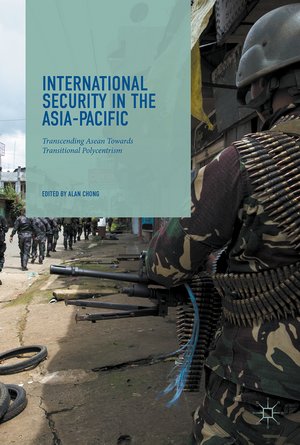International Security in the Asia-Pacific: Transcending ASEAN towards Transitional Polycentrism
Editat de Alan Chongen Limba Engleză Hardback – 2 oct 2017
| Toate formatele și edițiile | Preț | Express |
|---|---|---|
| Paperback (1) | 972.99 lei 38-44 zile | |
| Springer International Publishing – 14 aug 2018 | 972.99 lei 38-44 zile | |
| Hardback (1) | 1327.13 lei 6-8 săpt. | |
| Springer International Publishing – 2 oct 2017 | 1327.13 lei 6-8 săpt. |
Preț: 1327.13 lei
Preț vechi: 1618.45 lei
-18% Nou
Puncte Express: 1991
Preț estimativ în valută:
253.94€ • 265.85$ • 210.12£
253.94€ • 265.85$ • 210.12£
Carte tipărită la comandă
Livrare economică 05-19 aprilie
Preluare comenzi: 021 569.72.76
Specificații
ISBN-13: 9783319607610
ISBN-10: 3319607618
Pagini: 470
Ilustrații: XIII, 429 p. 2 illus. in color.
Dimensiuni: 148 x 210 mm
Greutate: 6.72 kg
Ediția:1st ed. 2018
Editura: Springer International Publishing
Colecția Palgrave Macmillan
Locul publicării:Cham, Switzerland
ISBN-10: 3319607618
Pagini: 470
Ilustrații: XIII, 429 p. 2 illus. in color.
Dimensiuni: 148 x 210 mm
Greutate: 6.72 kg
Ediția:1st ed. 2018
Editura: Springer International Publishing
Colecția Palgrave Macmillan
Locul publicării:Cham, Switzerland
Cuprins
Chapter 1: Southeast Asia : a Global Periphery No More - Dr Ooi Kee Beng, Institute of Southeast Asian Studies, Singapore.- Chapter 2: ASEAN Centrality in Defense and Security Cooperation in East Asia - Professor See Seng Tan, S. Rajaratnam School of International Studies, Singapore.- Chapter 3: ASEAN's Limits with respect to Conflict Resolution in the Region - Professor Kriengsak Chareonwongsak, Institute of Future Studies for Development, Thailand.- Chapter 4: Animating Transitional Polycentrism: the Role of China - Assistant Professor Hoo Tiang Boon, China Programme, S. Rajaratnam School of International Studies, Singapore.- Chapter 5: The Emerging Security Landscape in the Asia-Pacific: Where ASEAN fits - Professor Huang Xiaoming, Victoria University of Wellington, New Zealand.- Chapter 6: ASEAN in the Era of Japan-China Tensions: Diplomatic Opportunities or Strategic Dilemmas? - Associate Professor Takeshi Yuzawa, Hosei University, Japan.- Chapter 7: The Role of the US’ Quasi-Alliances in Asia: Shadow Puppetry or Hard Alliances? - Assistant Professor Charmaine Misalucha, De La Salle University, Philippines.- Chapter 8: Order in South Asia and the Indian Ocean Region: Indian Hegemony or Indian Primacy? - Dr. Manjeet S. Pardesi, Lecturer in International Relations, Victoria University of Wellington, New Zealand.- Chapter 9: Fostering Military Diplomacy with America’s Bilateral Allies: The Philippine Policy of Linking Spokes Together - Professor Renato Cruz de Castro, De La Salle University, Philippines.- Chapter 10: Reasons for Optimism? China, Japan and Unilateral Naval Restraint in the East China Sea - Dr Collin Koh, Maritime Programme, S. Rajaratnam School of International Studies, Singapore.- Chapter 11: The Asia-Pacific Diplomacy of Counter-Terrorism in Tackling the Threat from the Islamic State - Associate Professor Bilveer Singh, Department of Political Science, National University of Singapore, Singapore.- Chapter 12: Climate Change and Food Insecurities – Destabilizers of ASEAN Centrality? - Dr Tamara Nair, Centre for Non-Traditional Security, S. Rajaratnam School of International Studies, Singapore.- Chapter 13: Subnational Conflict Mitigation: Networks, innovations, and the uncertain place of ASEAN - Assistant Professor Linda Quayle, The University of Nottingham (Malaysia Campus), Malaysia.- Chapter 14: Silos, Synergies and Prospects for Cooperation in the Asia-Pacific: Humanitarian Assistance and Disaster Relief - Dr Alistair D.B. Cook, Centre for Non-Traditional Security, S. Rajaratnam School of International Studies, Singapore.- Chapter 15: Asia’s Military Competition by Proxy: Competitive HADR as a Respectable Arena? - Associate Professor Alan Chong, S. Rajaratnam School of International Studies, Singapore.- Chapter 16: Re-conceptualizing the Role of the Military for International Disaster Relief: Exploring the Factors Conditioning Responses by the Militaries of Japan, Taiwan, China, and South Korea - Mr Jeffrey Engstrom, RAND Corporation, USA.
Notă biografică
Alan Chong is Associate Professor at the S. Rajaratnam School of International Studies, Singapore. He has published widely on the notion of soft power and the role of ideas in constructing the international relations of Singapore and Asia.
Textul de pe ultima copertă
This volume argues that international security in the Asia-Pacific lends itself to contradictory analyses of centrifugal and centripetal trends. Transitional polycentrism is intrinsically awkward as a description of the security of states and their populations; it implies the loosening of state control and the emergence of newly asserted authority by mixed constellations of intergovernmental organizations and non-state actors. It implies a competition of agendas: threats to the integrity of borders and human security threats such as natural disasters, airliner crashes, and displacement by man-made pollution and food scarcity. Conversely, polycentrism could also imply a return to a more neo-realist oriented international order where great powers ignore ASEAN and steer regional order according to their perceived interests and relative military superiority. This book embraces these contradictory trends as a foundation of analysis and accepts that disorder can also be re-described from the perspective of studied detachment as polycentric order.
Caracteristici
Examines Asian security using a holistic thematic framework
Offers a wealth of 'grounded' experience to this area of academic scholarship
Many of the authors are practitioners in the field
Offers a wealth of 'grounded' experience to this area of academic scholarship
Many of the authors are practitioners in the field
